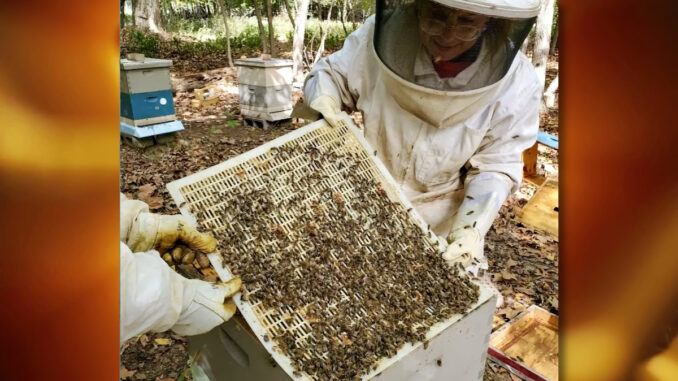
By NOREL BLUNDO
SPECIAL TO PASCACK PRESS
WESTWOOD—The Department of Public Works (DPW) is buzzing with excitement over its newest arrivals: two honey bee colonies, complete with thousands of worker bees, a few drones, and two queens. This initiative, led by the borough’s Environmental Advisory Committee (WEAC) in partnership with Jersey Girl Apiary LLC of Montvale, aims to boost local bee populations and educate the community about the critical role of pollinators.
“We’re really excited about this project,” says WEAC member Gary Dragona. “Bee populations in the U.S. have dramatically declined over the past two decades. We launched this effort to add to the local bee population and to provide opportunities for people to learn about bees and other pollinators and how incredibly important they are in maintaining both food supplies worldwide as well as healthy ecosystems for native plants and animals.”
Lisa Skoglund, master beekeeper and owner of Jersey Girl Apiary, emphasized the bees’ vital contributions. “Bees and pollinators are at the base of the circle of life. For starters, they are responsible for pollinating a third of the world’s food crops. Without them, we wouldn’t have a lot of the crops we depend on, including many fruits, vegetables, nuts, and oil-bearing plants.”
Beekeeper Jill Albano, a member of Skoglund’s team, added, “Through pollination, bees help trees and plants grow and bring back undergrowth, which creates habitats for small animals like rabbits, birds, and foxes.”
The DPW garage roof on Harrington Avenue offers an ideal habitat for the bees. “Bees love warm, sunny, dry places,” Skoglund explains. “Here they have sunlight from dawn to dusk. They’ll fly about three miles from their hives for food and water, and this area offers plenty — from the brook across the street to backyard gardens and Westwood’s Community Garden at Westvale Park.” The roof also protects the bees from predators and human disturbances.
Each hive houses about 20,000 European honey bees (Apis melliferae), the most common species of honey bee. The colonies are preparing for winter, with only female worker bees and the queen remaining active to keep the hive alive. Come spring, drones will re-emerge to mate with the queen, and the hive populations will double as worker bees resume collecting nectar and pollen. Any surplus honey, after the bees’ needs are met, will be available for sale locally.
Beekeeping, Skoglund says, is more than a business. “We love bees, but keeping them is hard work. Bees are livestock, and they have to be cared for year-round.” She cautions against installing backyard hives without proper training, which is required by the New Jersey Department of Agriculture.
Both Jersey Girl Apiary and the WEAC say they hope the project will inspire the community to support pollinators. Skoglund encourages planting trees and flowers, providing water for pollinators, and embracing less-manicured lawns. “Let the clover grow. Let the dandelions grow. The bees will love you for it.”
About the author: Norel Blundo has been a member of the WEAC for seven years. The committee welcomes ideas and input from residents on any environmental issues affecting the Westwood community.
